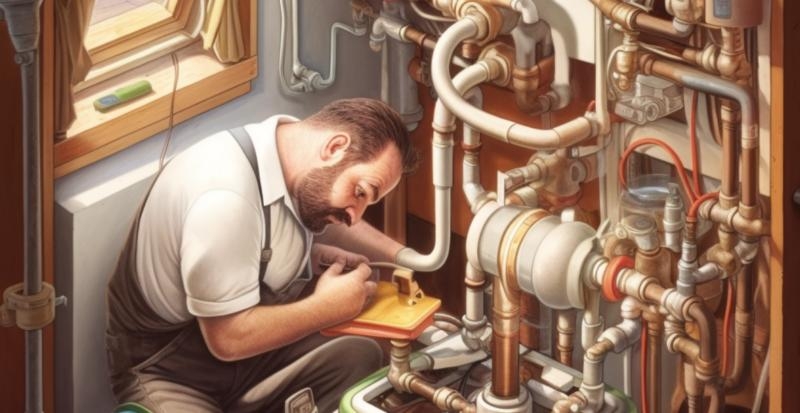History of Plumbing: Civilizations and Innovations

From Ancient Mesopotamia to Modern Toilets: A Journey Down the DrainIf there's one thing that unites humanity, it's our shared appreciation for a good, clean bathroom. The history of plumbing stretches back nearly 5,000 years, with each civilization adding new innovations to the mix. And while our ancient ancestors might have had slightly different bathroom habits than we do today, many of their innovations have persisted through the ages.
Early Innovations: When Civilization Got FlushedPlumbing as we know it began in the ancient civilizations of Mesopotamia, Egypt, and the Indus Valley around 3,000 BCE. These early societies discovered the benefits of living near rivers, harnessing their waters for irrigation, sanitation, and even the occasional leisurely boat ride.
- Mesopotamia: The people of Mesopotamia built canals and aqueducts to bring water from the Tigris and Euphrates rivers to their cities. And because life was just more elegant back then, these early urbanites invented the first sewer systems to whisk away their wastewater.
- Egypt: The ancient Egyptians built stone pipes and used copper tubing to transport water in and out of their homes. They also built public latrines and even used sand and clay to filter water, proving that even back then, cleanliness was godliness.
- Indus Valley: The Indus Valley civilization, located in what is now modern-day Pakistan and northwest India, was home to some of the most advanced plumbing systems of its time. They constructed elaborate drainage systems and used clay pipes to transport water and waste. In addition, they were one of the first to develop indoor plumbing, as evidenced by their advanced toilets and bathing facilities.
Greek and Roman Baths: The Ancient Social NetworkWhile the ancient Greeks and Romans may not have been the first to enjoy indoor plumbing, they undoubtedly raised it to an art form. The ancient Romans, in particular, built some of the most advanced and sophisticated plumbing systems in the world, complete with underground pipes, sewers, and public toilets. These early engineers also invented the aqueduct, a monumental achievement that allowed them to transport water over long distances and supply their growing cities.
But the crowning achievement of ancient plumbing may have been the Roman bathhouses. These magnificent structures were the social hubs of ancient Rome, where citizens could gather to bathe, exercise, and gossip. With heated floors, intricate mosaics, and even libraries, the bathhouse was the ancient equivalent of a luxury spa. And while most Romans still had to use a shared public toilet called a “latrina” (which, let’s be honest, sounds more like a character from a Roman sitcom than a bathroom), those lucky enough to have a private toilet in their home sometimes even had a system of running water to whisk away their waste.
The Dark Ages: A Sanitary NightmareUnfortunately, all good things must come to an end, and as the Roman Empire declined, so too did the quality of its public sanitation. The once-great aqueducts fell into disrepair, and people were forced to rely on wells and rivers for their water. The streets of medieval Europe were, in a word, disgusting – with open sewers lining the roads and chamber pots routinely dumped out windows. It was a pretty grim time to be a plumber.
The Renaissance: A Revival of HygieneAs Europe emerged from the Dark Ages, a new spirit of innovation took hold, and the art of plumbing was revived. The 16th and 17th centuries saw the invention of the flush toilet, the S-trap (a curvy pipe that prevents sewer gas from entering your home), and the first water closet. Of course, these early prototypes were far from perfect – they were prone to leaks, had poor water pressure, and frequently emitted a foul odor – but they set the stage for modern plumbing and brought some much-needed hygiene to the masses.
Modern Plumbing: A (Mostly) Odor-Free InnovationToday, we enjoy the benefits of indoor plumbing and modern sanitation, thanks in part to the innovations of our ancestors. Our pipes are now made of durable materials like PVC and PEX, we have hot and cold running water at the turn of a knob, and our toilets are mercifully odor-free. And while we may take our modern conveniences for granted, it's important to remember the long and winding road (or should we say, drain) that got us here.
So the next time you find yourself cursing a clogged toilet or grumbling about a leaky faucet, just remember: you could be living in a world where your only option was a shared latrine on the streets of ancient Rome. And with that thought, I leave you with this valuable piece of advice: Always appreciate your plumber, for they are the unsung heroes that keep our modern lives flowing smoothly down the drain.
|
|







